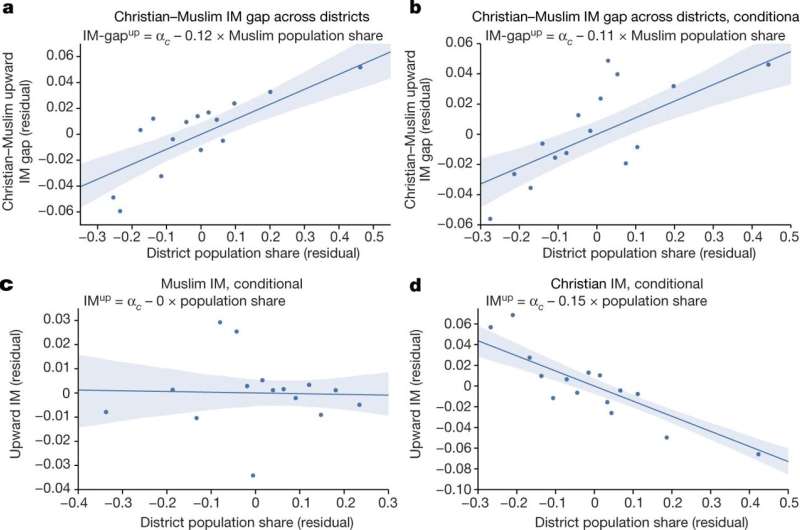May 22, 2023 report
This article has been reviewed according to Science X's editorial process and policies. Editors have highlighted the following attributes while ensuring the content's credibility:
fact-checked
peer-reviewed publication
trusted source
proofread
Census data show differences in education levels attained in Africa based on religion

A small team of economists from Harvard University, Sihlquai 10, Adliswil, Brown University, and the London Business School has found differences in education level attainment across Africa based at least in part on religion. In their paper published the journal Nature, the group describes how they used data collected via censuses in multiple countries in Africa to learn more about whether education levels in Africa are impacted by religious affiliation.
In all the team looked at census data for 21 African countries, noting that religion plays a very important role in not just daily life, but also in education, across the continent. They also note that Africa is home to some of the largest Muslim and Christian communities and that participation rates in religious activities are high.
To learn more about the impact of religion on education, the team compared average levels of educational attainment with religion type. In so doing, they found what they describe as significant differences in intergenerational educational mobility across these two main groups of people. The researchers define intergenerational educational mobility as a measure of offspring going farther in their educational attainment than their parents.
The research group found that Christians tended to have higher upward mobility and lower downward mobility than did Muslims and traditionalists. They suggest this indicates that Christian children are more likely to complete primary school if their parents did not, and are less likely to drop out of primary school if their parents did finish.
It also suggests that Muslim and traditionalist children are more likely to drop out of primary school even if their parents did not drop out, and that they are also less likely to complete such education if their parents did not.
In looking at other factors the research team was not able to find any other that might account for such differences in educational attainment. But they do note that history has likely played a role in the differences they have seen. Colonialism, which often began with the introduction of Christian missionaries, they point out, tended to stress education. Meanwhile, colonial authorities tended to restrict education when encountering people who were established Muslims.
The researchers conclude by suggesting that their findings indicate that officials looking to improve educational attainment in Africa may need to take a closer look at the impact that religion plays in participation in programs geared toward raising education levels and make adjustments accordingly.
More information: Alberto Alesina et al, Religion and educational mobility in Africa, Nature (2023). DOI: 10.1038/s41586-023-06051-2
Journal information: Nature
© 2023 Science X Network


















